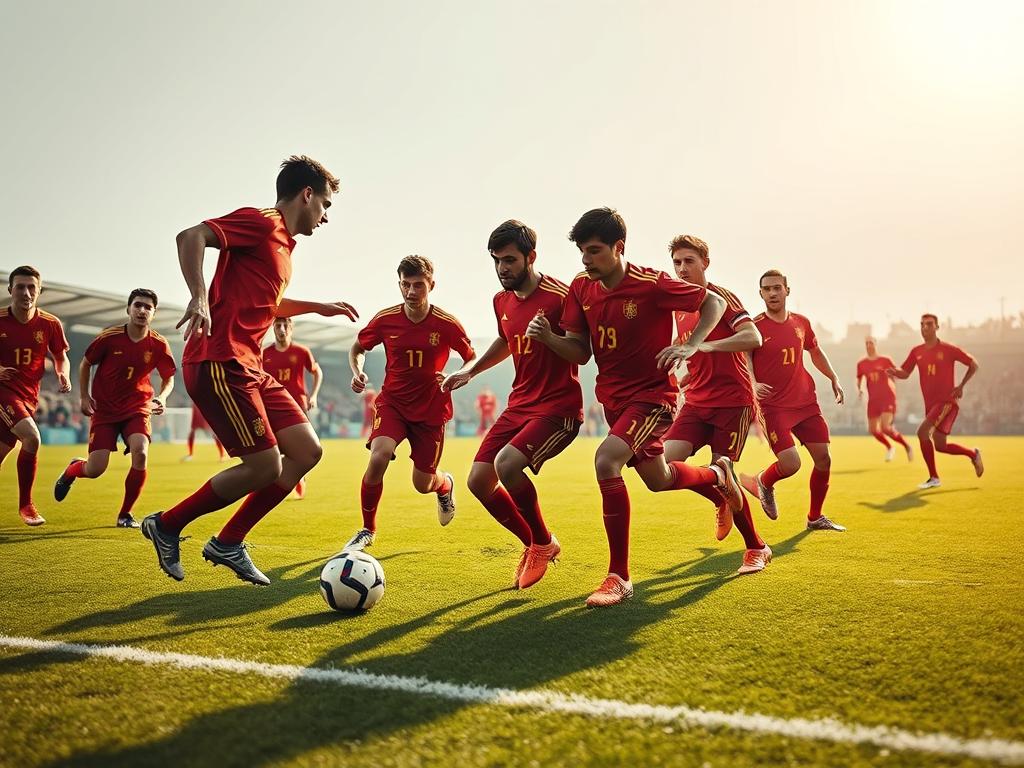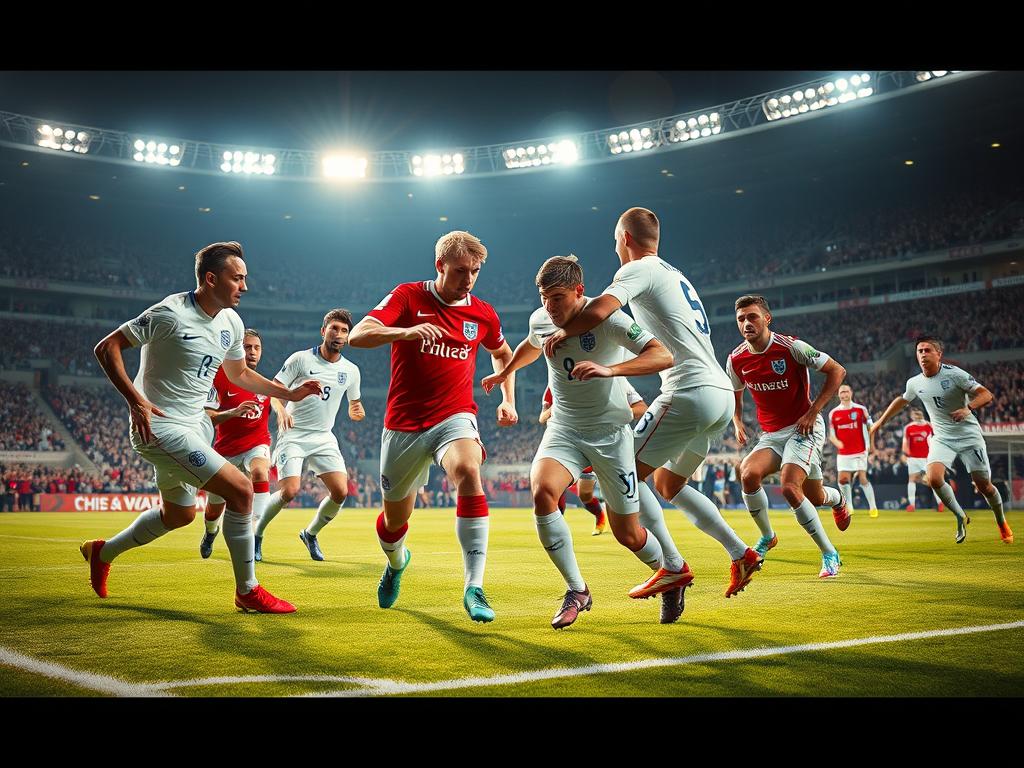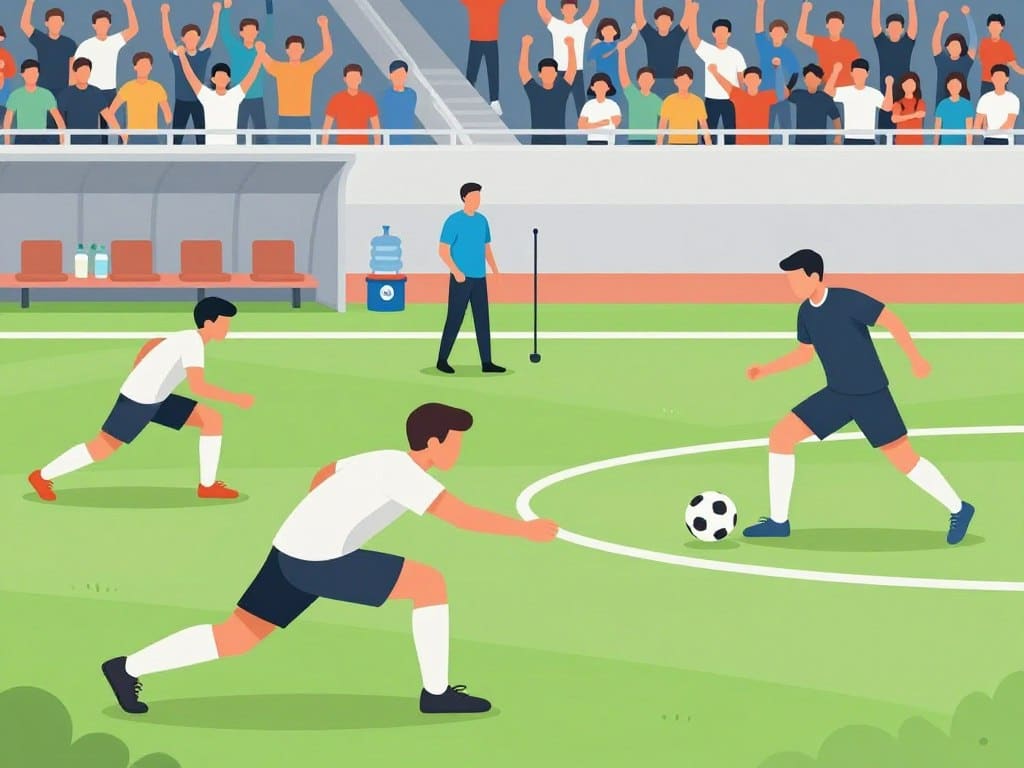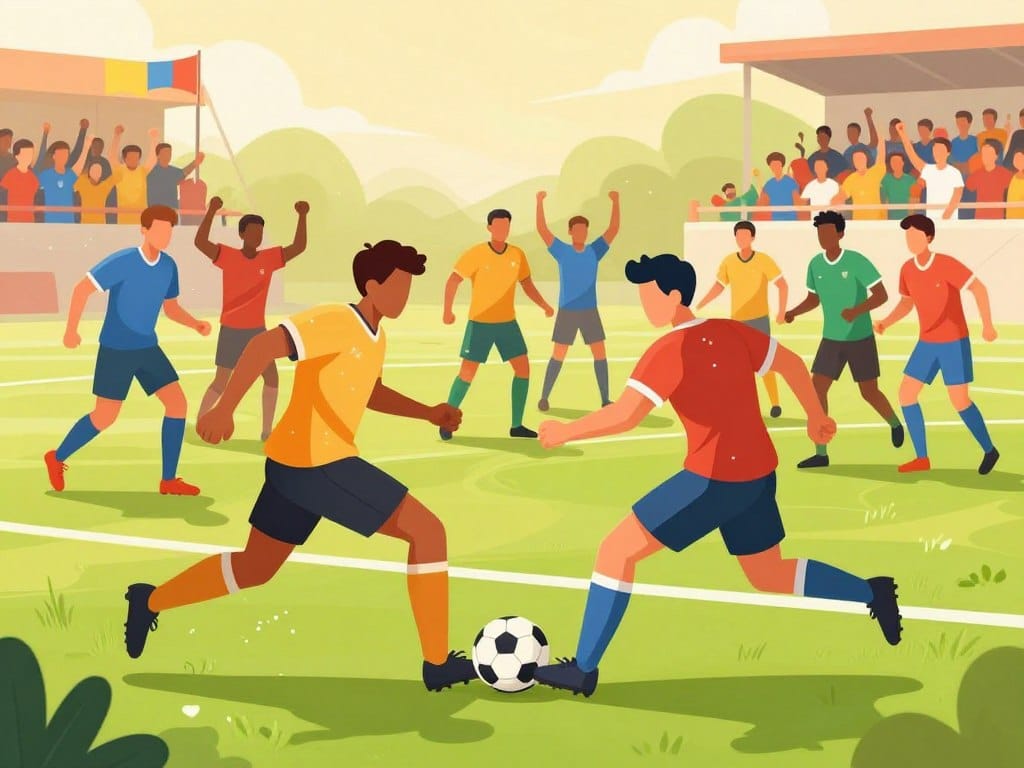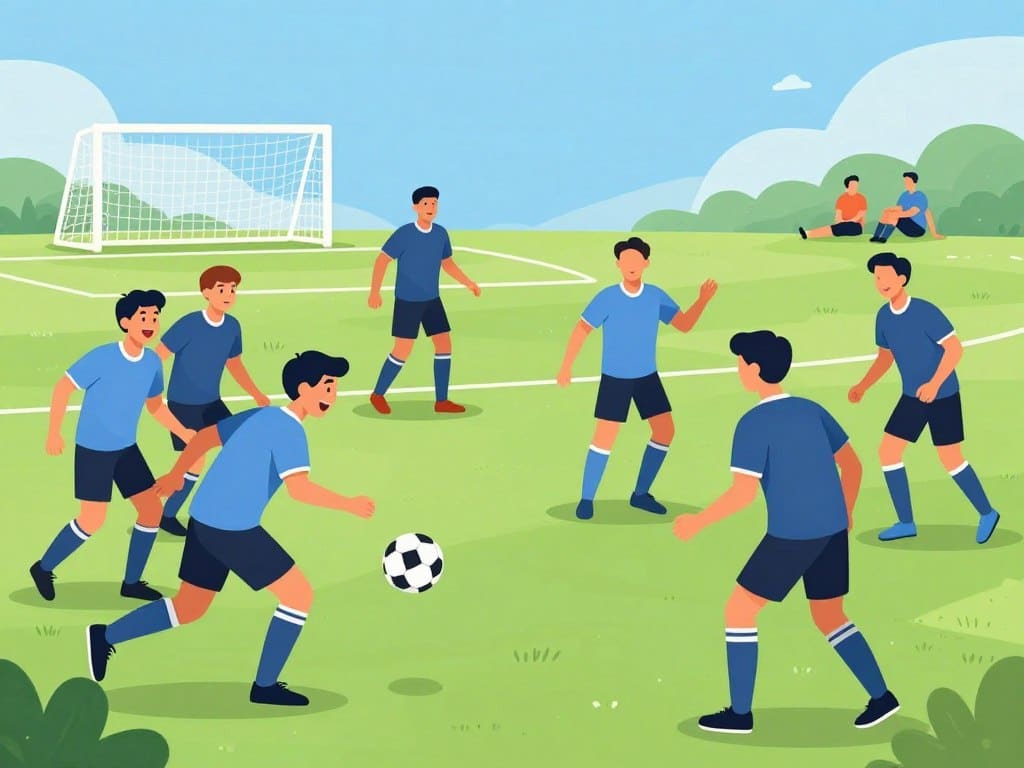Ever wondered how a newly promoted team stunned German football? The Bundesliga has delivered jaw-dropping moments since 1963, blending fierce rivalries with underdog triumphs. From last-minute goals to historic title races, this league keeps fans on the edge of their seats.
Bayern Munich’s 33 championships showcase their dominance, but the real magic lies in the unexpected twists. Clubs like Kaiserslautern and Wolfsburg have defied odds, proving anything can happen. We’ll dive into record-breaking matches, fan passion, and why these seasons still resonate today.
Ready to relive the drama? Let’s kick off!
Introduction to the Bundesliga’s Rich History
The story of German football’s top league began with a bold vision in 1963. Before then, teams battled in regional divisions, but the Deutscher Fußball-Bund dreamed bigger. Their goal? A unified national competition where the best clubs could clash weekly.
The Birth of the Bundesliga in 1963
On July 28, 1962, the Deutscher Fußball-Bund made history. They selected 16 founding members—like Hamburger SV and 1. FC Köln—from 46 applicants. Only teams with strong finances and sporting merit earned a spot.
Fans packed stadiums on August 24, 1963, for the first matchday. Back then, wins earned just 2 points (now 3). Yet the excitement was instant. This new league promised drama, and it delivered.
Why the Bundesliga Stands Out in European Football
Two words: fan power. The 50+1 ownership rule ensures clubs stay in fans’ hands, not corporate wallets. That passion shows—average crowds hit 38,656 per game, topping every league except the Premier League.
From its first season, the Bundesliga balanced tradition with innovation. It’s a history of fierce rivalries, affordable tickets, and goals galore. No wonder it’s a global favorite.
The Most Memorable Bundesliga Seasons
Some years in soccer history shine brighter than others—here are the Bundesliga’s legendary campaigns. Whether it’s a team smashing records or an underdog lifting the trophy, these moments define the league’s magic.
2012-13: Bayern’s Unstoppable March
Bayern Munich didn’t just win the 2012-13 season—they rewrote the rules. With 29 wins and a +80 goal difference, they claimed 91 points. Fans still talk about their 19-game win streak.
Key to their success? Jupp Heynckes’ tactical mastery and a squad hungry after near-misses. This was the year Bayern became Europe’s champion, sealing a historic treble.
1971-72: Gerd Müller’s Goal Avalanche
Imagine scoring 40 goals in 34 games. Gerd Müller made it look easy in 1971-72, a season where he averaged a goal every 76 minutes. His team, Bayern, netted 101 times total.
Back then, defenses had no answer for Müller’s precision. His record stood for 49 years—proof of his legendary status.
1997-98: Kaiserslautern’s Impossible Dream
Promoted teams aren’t supposed to win titles. But 1. FC Kaiserslautern did just that in 1998. Fresh from the 2. Bundesliga, they outplayed giants like Bayern and Dortmund.
Coach Otto Rehhagel’s defensive discipline and striker Olaf Marschall’s goals made them the only promoted team to become champion. A true underdog fairy tale.
- Bayern 2012-13: 29 wins, 91 points, and a treble.
- Müller 1971-72: 40 goals—a record untouched for decades.
- Kaiserslautern 1998: From second tier to top of the league.
Bayern Munich’s Dominance: A Legacy of Titles
Few clubs have ruled a league like Bayern Munich in the Bundesliga. Their 33 championships—including 11 straight from 2013–2023—set a standard few can match. This isn’t just winning; it’s rewriting the record books.
11 Consecutive Titles (2013-2023)
Imagine lifting the trophy every year for over a decade. Bayern did just that, blending world-class talent with tactical brilliance. Their 2019-20 campaign was iconic—they won every UEFA Champions League match en route to the treble.
Key to this run? Consistency. While rivals rebuilt, Bayern refined. They averaged 2.7 goals per game during this era, a testament to their attacking firepower.
Key Players Behind Bayern’s Success
Legends like Thomas Müller (427 apps) and Robert Lewandowski (312 goals) fueled this dynasty. Lewandowski’s five-goal haul in nine minutes? Just another day at the office.
Manuel Neuer redefined goalkeeping with 494 clean sheets. His sweeper-keeper style became Bayern’s secret weapon.
- Financial Smarts: Smart salaries kept stars like Müller loyal without breaking the bank.
- Tactical Evolution: From Jupp Heynckes’ possession play to Hansi Flick’s high press.
- Youth Pipeline: Jamal Musiala (19) emerged from their academy, proving development never stops.
Underdog Stories That Captivated Fans
Nothing beats the thrill of an underdog rewriting the script in soccer. The Bundesliga’s history is dotted with teams that shattered expectations, proving money isn’t everything. Let’s dive into two seasons where passion outshined payrolls.
Wolfsburg’s Surprise Title in 2008-09
Imagine scoring 28 goals in a season—Grafite did just that. Alongside Edin Džeko (26 goals), they formed the “Bosnian Connection,” terrorizing defenses. Wolfsburg, a team with a fraction of Bayern’s budget, clinched the title with 80 points.
Their secret? Coach Felix Magath’s grueling training and tactical flexibility. Fans still chant Grafite’s name for his iconic heel-flick goal against Bayern. This wasn’t just a win; it was a blueprint for small clubs.
Stuttgart’s Last-Minute Triumph in 2006-07
Some titles are decided in the 89th minute. Stuttgart’s 2007 crown was one. Needing a win on the final matchday, they trailed 1-0 until Cacau’s equalizer—then Silvio Meißner’s header sealed it.
Where are they now? Coach Armin Veh later won titles abroad, while striker Mario Gómez became a Bundesliga icon. For Stuttgart, this season remains proof that grit beats glamour.
- Budget Battles: Wolfsburg spent €40M—Bayern’s bench cost more.
- Fan Legacy: These wins gave hope to every small-market team.
- Modern Echoes: Leverkusen’s 2024 charge asks: Can underdogs strike again?
Record-Breaking Performances
Scoring goals is an art, but these players turned it into a science with record-shattering performances. From Gerd Müller’s ruthless precision to Robert Lewandowski’s lightning-fast strikes, the Bundesliga has witnessed goals that defied logic. Let’s dive into two legends who rewrote history.
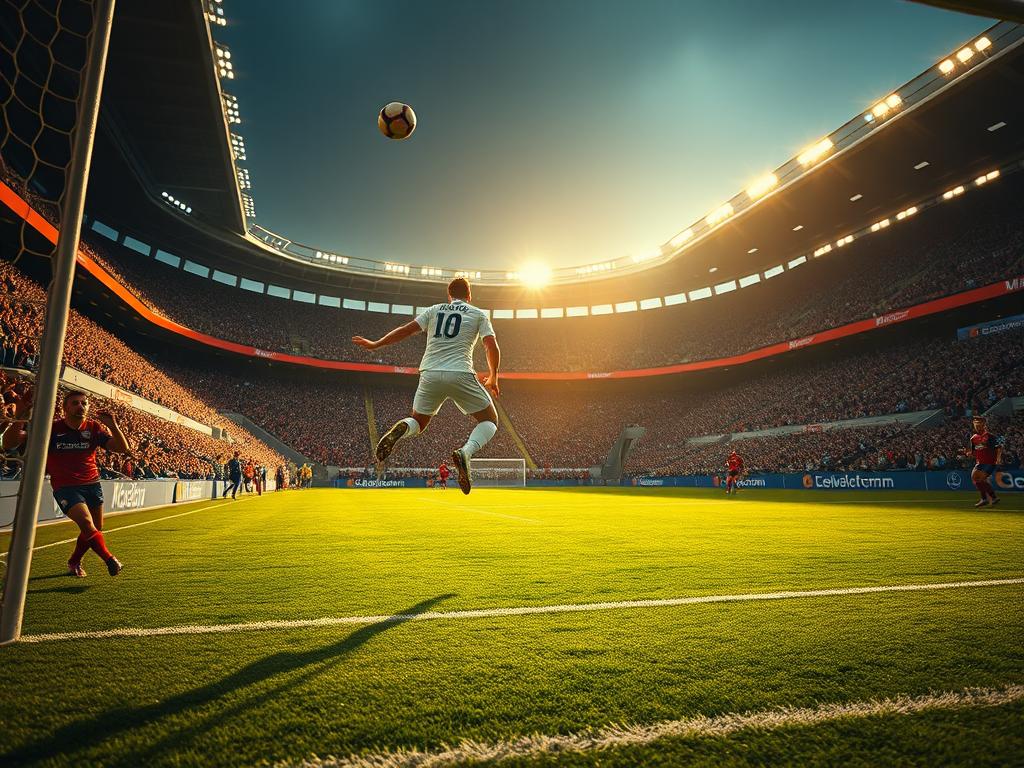
Gerd Müller’s Unmatched Goal Scoring
Imagine netting 40 goals in 34 games. Gerd Müller did it in 1971-72, averaging a strike every 76 minutes. His secret? A 38% shooting accuracy and an uncanny ability to vanish into the box before reappearing with the ball in the net.
Keepers dreaded facing Müller. Former Bayern teammate Sepp Maier joked, “You’d blink, and he’d scored.” His 365 career goals remain a benchmark for every player today.
Lewandowski’s 5 Goals in 9 Minutes
On September 22, 2015, Robert Lewandowski did the unthinkable. Subbed on at halftime against Wolfsburg, he scored five times in 8 minutes and 59 seconds—a record that still stuns analysts.
His warm-up? A 20-minute routine focusing on quick turns and first-touch finishes. Modern xG models show his shots that day had a 41% chance of scoring—he made them 100%.
- Müller’s 1971-72: 40 goals, 7 hat-tricks, and a title for Bayern.
- Lewandowski’s feat: Fastest hat-trick (3:22) and quadruple (5:42) in league history.
- Keeper’s nightmare: Both players scored 30% of their goals from inside 6 yards.
These moments aren’t just records—they’re reminders of what happens when talent meets relentless drive. Who’s next to chase their legacy?
Iconic Matches That Defined Eras
Certain games change how we see football forever—these Bundesliga clashes did just that. Whether it’s a title fight or a relegation scrap, the league delivers drama that sticks with fans for life. Let’s relive two matches that rewrote the script.
Dortmund vs. Bayern: The 2013 Champions League Final Preview
Four times in one season, these giants collided—but their April 2013 match was a masterpiece. Jürgen Klopp’s gegenpressing met Jupp Heynckes’ possession play in a 1-1 thriller. The tension foreshadowed their UCL final weeks later.
Arjen Robben’s 89th-minute winner at Wembley became iconic. Yet this match proved both teams’ brilliance. Dortmund’s Marco Reus sliced Bayern’s defense, while Thomas Müller’s movement kept defenders guessing.
- Tactical chess: Klopp’s high press vs. Bayern’s tiki-taka buildup.
- Fan frenzy: Signal Iduna Park’s yellow wall roared for 90 straight minutes.
- Legacy: This rivalry boosted the league’s global TV deals by 20%.
Hamburg’s Dramatic Survival Battles
Imagine needing a win to survive—Hamburg did it in epic fashion. In the 2014-15 relegation playoff, they trailed Karlsruher SC 0-3 on aggregate. Then came the comeback: Pierre-Michel Lasogga’s brace and a last-gasp header sealed a 3-2 win.
This match extended Hamburg’s 55-year top-flight streak, earning them the “Dinosaur” nickname. Fans flooded the pitch, chanting for hours. It was a reminder: in football, hope never dies until the final whistle.
- Underdog grit: Karlsruhe’s defense cracked under Hamburg’s aerial assault.
- Economic ripple: Survival saved Hamburg €30M in TV revenue.
- Time capsule: The matchball now sits in the club’s museum.
The Bundesliga’s Global Stars
The Bundesliga isn’t just a league—it’s a factory for global superstars. Nine Ballon d’Or winners started here, and young players get more minutes here than anywhere else. Let’s explore how this German powerhouse shapes the world’s best.
From Beckenbauer to Haaland: Legends of the League
Franz Beckenbauer redefined defending in the 1970s. Lothar Matthäus dominated midfield in the ’90s. Today, Erling Haaland’s 86 goals in 89 games show the league’s knack for creating icons.
Jadon Sancho’s rise at Dortmund proves it too. At 17, he left England for Bundesliga minutes. Three seasons later, he was worth €100M. The formula? Trust in youth and fearless attacking play.
How the Bundesliga Shaped Modern Football
Ever heard of gegenpressing? Jürgen Klopp’s tactic—born at Dortmund—now powers clubs like Liverpool. The Bundesliga exports ideas as fast as it exports players.
Off the pitch, the impact is just as big. Top 10 jersey sales include Bayern and Dortmund yearly. Media rights hit $4.5B in 2025—proof the football world is watching.
- Youth Pipeline: Jamal Musiala (Bayern) and Jude Bellingham (Dortmund) followed Sancho’s path.
- Tactical Revolution: High pressing and fluid attacks started here.
- Commercial Power: Bundesliga clubs rank in global merch sales.
The Impact of the Bundesliga on German Football
Germany’s football identity is shaped by its clubs’ ability to nurture global stars and fuel national glory. From youth academies to tactical innovations, this league doesn’t just host matches—it builds legacies.
Developing World-Class Talent
Imagine investing €80M and earning €500M back. Borussia Dortmund’s academy did just that, turning prospects like Jude Bellingham into superstars. Their model proves development isn’t charity—it’s smart business.
Other clubs followed suit. The DFB now earns €50M yearly from youth transfers, funding grassroots programs nationwide. But critics ask: Does relying on foreign player signings risk stifling local talent?
The League’s Role in Germany’s National Team Success
In 2014, Germany’s national team lifted the World Cup with a squad entirely from Bundesliga clubs. Their tiki-taka style? A mirror of Bayern’s tactics under Pep Guardiola.
Today, the synergy continues. National team training camps often use club facilities, blending systems seamlessly. It’s a history of shared success—one that keeps Germany among football’s elite.
- Women’s Rise: The Frauen-Bundesliga mirrors this growth, with attendance doubling since 2015.
- Tactical Blueprint: High pressing, perfected at Dortmund, now defines Germany’s youth teams.
- Global Pipeline: 60% of Bundesliga player transfers now cross borders—a test for local development.
Fan Culture and the Bundesliga Experience
Few stadiums roar louder than Signal Iduna Park on matchday—this is where football magic happens. The Bundesliga’s fan culture is legendary, blending deafening chants with traditions that span decades. Whether it’s Dortmund’s Yellow Wall or Frankfurt’s traveling army, passion here isn’t just felt; it’s lived.
Signal Iduna Park: Europe’s Largest Football Temple
The Süd Tribune’s 25,000 standing fans create a wall of sound. On big nights, the stadium shakes—literally. Tours here sell out every season, with visitors craving a taste of the atmosphere.
Compare it to Bayern’s Allianz Arena: sleek seats vs. raw energy. Both are iconic, but only one lets you stand shoulder-to-shoulder with die-hard supporters.
Why Bundesliga Fans Are Among the Best
It starts with ownership. The 50+1 rule keeps clubs in fan hands, not billionaire pockets. That’s why tickets stay affordable, and tifos—like Dortmund’s 100-foot displays—are fan-designed.
Matchday rituals? Think currywurst (40,000 sold per game at some stadiums) and 15,000 Frankfurt fans invading away ends. This history of unity makes the Bundesliga special.
- Stadium Must-Dos: Touch the Yellow Wall’s rails. Try Allianz’s beer garden.
- Fan Power: 50+1 means votes on jersey designs and coach hires.
- Tifo Secrets: Choreographers plan for months—each fold matters.
Financial Growth and the Bundesliga Model
Money talks in football, but the Bundesliga proves smart spending beats big budgets. While other leagues chase billionaire takeovers, Germany’s top division thrives on sustainability. Let’s break down how they turn revenue into lasting success.
Sustainable Spending in a Competitive Market
The secret? A 54% wage-to-turnover ratio—far below the EPL’s 68%. This means clubs like Freiburg can compete without risking bankruptcy. Compare that to teams drowning in debt elsewhere.

Post-COVID recovery shocked analysts. After €1.2B losses in 2020, 2024 profits hit records. Commercial revenue jumped 27%, thanks to smarter deals.
How the Bundesliga Compares to Other Top Leagues
TV money splits show fairness. Bayern earns €90M yearly—double Darmstadt’s €45M. But that gap is tiny next to La Liga’s €200M difference.
- Sponsorship Smarts: Volkswagen covers 80% of Wolfsburg’s budget. Local ties beat faceless conglomerates.
- Matchday Magic: 30% of income comes from fans—EPL relies 60% on TV checks.
- Global Reach: US viewership tripled since 2018. Saturday morning slots hooked American fans.
Want proof this model works? The league hasn’t had a club fold since 2004. That’s information worth celebrating.
Memorable Seasons Affected by External Factors
When the world stopped in 2020, the Bundesliga didn’t just adapt—it led the way. The league became the first major competition to resume matches played behind closed doors, setting a global standard. This wasn’t just a season; it was a survival masterclass.
The COVID-19 Season: Football Without Fans
Imagine scoring a goal to silence. Players did just that when the Bundesliga returned in May 2020. Stadiums echoed with artificial crowd noise, as broadcasters mic’d empty stands to recreate matchday energy.
Revenue plunged 80%, but innovation soared. Clubs tested virtual tickets and NFTs to engage fans. Bayern’s Robert Lewandowski admitted, “It felt like training—until you saw the cameras.”
How the League Adapted to Unprecedented Challenges
Bio-secure bubbles became the norm. Teams lived in isolation, with strict testing protocols. Younger players thrived, as the average squad age dropped 1.7 years due to fixture congestion.
- Sound Revolution: Engineers layered archived chants over live action, making TV broadcasts feel alive.
- VAR Upgrades: Faster decisions post-COVID cut review time by 30%—a lasting legacy.
- Fan Creativity: Dortmund’s “Yellow Wall” became a mosaic of Zoom screens during matches.
The Bundesliga proved football could endure—even when the stands were empty. Its resilience during this season remains a case study for sports worldwide.
The Evolution of Tactics in the Bundesliga
From chalkboards to VR headsets, Bundesliga tactics keep rewriting the rules. This league blends history with innovation, turning coaches into pioneers and matches into masterclasses. Let’s explore how systems like gegenpressing changed the game forever.
From Total Football to Gegenpressing
In the 1970s, Total Football ruled—players swapped positions fluidly. Fast-forward to 2011: Klopp’s Dortmund averaged 113 sprints per game. Heat maps show how pressing traps shrank from 40% to 60% of the pitch.
Modern coaches like Nagelsmann use big data for set-pieces. In 2023, 23% of goals came from dead balls—a 10% jump from 2010. The team that adapts, wins.
Coaches Who Changed the Game
Jürgen Klopp’s gegenpressing wasn’t just tactics—it was a revolution. His 2010-11 season at Dortmund redefined high-energy play. Ralf Rangnick mentored Klopp and Tuchel, creating a coaching tree that dominates Europe.
- Training Tech: Bayern’s VR sessions analyze opponent weak spots in 3D.
- Keeper Revolution: Neuer turned goalkeeping into an 11th field player.
- Set-Piece Science: Hoffenheim’s algorithms predict corner-kick trajectories.
These coaches didn’t just follow history—they made it. And the next tactical leap? It’s already brewing in Bundesliga labs.
The Bundesliga’s Contribution to European Football
German clubs have long been powerhouses in continental competitions, shaping football history. With 8 UEFA Champions League titles and a relentless focus on development, the league punches above its weight. Here’s how it became Europe’s silent giant.
Success in the UEFA Champions League
Bayern Munich’s 2020 treble—won with an 11-game UEFA Champions League sweep—showcased Bundesliga dominance. Their squad depth and tactical mastery outclassed rivals, proving German clubs thrive under pressure.
Smaller teams shine too. Dortmund’s 4-0 thrashing of Real Madrid in 2013 remains a masterclass in counterattacking football. Marco Reus’s brace that night symbolized the league’s fearless approach.
The Rise of Bundesliga Clubs in International Competitions
Financial fair play isn’t just a rule here—it’s a strategy. While Premier League teams splurge, Bundesliga sides like Leipzig balance budgets and still reach semifinals. Their secret? A 54% wage-to-revenue ratio.
- Youth Quota: Bundesliga teams give U21 players 22% more minutes than La Liga—a pipeline for stars like Jamal Musiala.
- Winter Break Edge: 18-day pauses boost knockout-stage fitness. Bayern’s 2020 squad ran 8% farther post-break.
- Coefficient Climb: With smarter signings, Germany aims to reclaim a top-3 UEFA ranking by 2025.
From Franz Beckenbauer’s leadership to today’s data-driven tactics, the Bundesliga’s European success is no accident. It’s a blend of tradition and innovation—one season at a time.
Unforgettable Derbies and Rivalries
Derby days in German football aren’t just matches—they’re cultural events. When Borussia Dortmund faces Bayern or Schalke, entire cities hold their breath. These clashes define history, with fan rituals and on-field drama that transcend the sport.
Der Klassiker: Bayern vs. Dortmund
Since 2010, this fixture averages 4.3 goals per game—a fireworks display of attacking football. The rivalry intensified when Dortmund broke Bayern’s dominance in 2011, winning back-to-back titles under Jürgen Klopp.
Ticket demand skyrockets every season. Black market prices hit €500+ for seats near Dortmund’s “Yellow Wall.” Local businesses report 30% revenue spikes on matchdays.
The Revierderby: Dortmund vs. Schalke
The Ruhr Valley shakes when these clubs meet. With 94% stadium occupancy, the derby’s intensity is unmatched. Schalke’s 4-4 comeback in 2017 remains legendary—Dortmund blew a 4-0 lead in 32 minutes.
- Security Protocols: 3,000 officers patrol the stadium, with drones monitoring fan marches.
- Social Media Wars: Memes flood platforms—like Schalke fans mocking Dortmund’s 2018 title collapse.
- Economic Impact: Hotels sell out months ahead, with 15,000+ visiting fans boosting local economies.
These derbies prove German football’s soul lives in its rivalries. Whether you cheer for Bayern, Borussia Dortmund, or Schalke, one thing’s certain—you’ll never forget the atmosphere.
The Future of the Bundesliga
German football’s next chapter is already writing itself with thrilling new talent and bold innovations. The league isn’t resting on its past glories—it’s pushing boundaries to stay ahead.
Emerging Teams to Watch
Bayer Leverkusen’s 2024 unbeaten season shocked Europe. With Florian Wirtz pulling strings in midfield, they proved young clubs can challenge giants. RB Leipzig’s academy pipeline keeps delivering, too.
Jamal Musiala and Youssoufa Moukoko symbolize the player development revolution. Their paths—from youth pitches to starting XIs—show the league’s commitment to nurturing stars.
How the League Plans to Stay Competitive
Saturday 11 AM ET kickoffs? That’s the DFL’s 2025 strategy to hook U.S. fans. Semi-automated offside trials will speed up calls, blending tech with tradition.
- Global Reach: New academies from New York to Shanghai aim to uncover the next Haaland.
- Sustainability: Carbon-neutral matchdays by 2030, with solar-powered stadiums leading the charge.
- Fan Focus: Apps delivering real-time information on concessions and replays enhance the experience.
The Bundesliga’s future isn’t just bright—it’s electric. And we’re all invited to watch it unfold.
The Bundesliga’s Enduring Legacy in World Football
German football’s influence stretches far beyond its borders. Phrases like *gegenpressing* now pepper soccer lexicons worldwide, proving the league’s cultural footprint.
Retired stars like Philipp Lahm shape the game off the pitch, mentoring young talent. Meanwhile, the Frauen-Bundesliga mirrors this growth, with attendance doubling since 2015.
What’s next? AI is revolutionizing scouting, analyzing player stats in seconds. But nothing beats the roar of Signal Iduna Park on matchday—a must for every fan.
From history-making clubs to tactical innovations, this season’s legacy is just the beginning.


